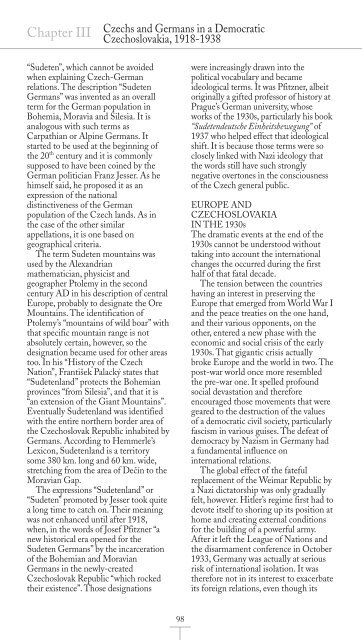the nationality of all inhabitants of the czech provinces and ...
the nationality of all inhabitants of the czech provinces and ...
the nationality of all inhabitants of the czech provinces and ...
You also want an ePaper? Increase the reach of your titles
YUMPU automatically turns print PDFs into web optimized ePapers that Google loves.
Chapter III<br />
“Sudeten”, which cannot be avoided<br />
when explaining Czech-German<br />
relations. The description “Sudeten<br />
Germans” was invented as an over<strong>all</strong><br />
term for <strong>the</strong> German population in<br />
Bohemia, Moravia <strong>and</strong> Silesia. It is<br />
analogous with such terms as<br />
Carpathian or Alpine Germans. It<br />
started to be used at <strong>the</strong> beginning <strong>of</strong><br />
<strong>the</strong> 20 th century <strong>and</strong> it is commonly<br />
supposed to have been coined by <strong>the</strong><br />
German politician Franz Jesser. As he<br />
himself said, he proposed it as an<br />
expression <strong>of</strong> <strong>the</strong> national<br />
distinctiveness <strong>of</strong> <strong>the</strong> German<br />
population <strong>of</strong> <strong>the</strong> Czech l<strong>and</strong>s. As in<br />
<strong>the</strong> case <strong>of</strong> <strong>the</strong> o<strong>the</strong>r similar<br />
appellations, it is one based on<br />
geographical criteria.<br />
The term Sudeten mountains was<br />
used by <strong>the</strong> Alex<strong>and</strong>rian<br />
ma<strong>the</strong>matician, physicist <strong>and</strong><br />
geographer Ptolemy in <strong>the</strong> second<br />
century AD in his description <strong>of</strong> central<br />
Europe, probably to designate <strong>the</strong> Ore<br />
Mountains. The identification <strong>of</strong><br />
Ptolemy’s “mountains <strong>of</strong> wild boar” with<br />
that specific mountain range is not<br />
absolutely certain, however, so <strong>the</strong><br />
designation became used for o<strong>the</strong>r areas<br />
too. In his “History <strong>of</strong> <strong>the</strong> Czech<br />
Nation”, František Palacký states that<br />
“Sudetenl<strong>and</strong>” protects <strong>the</strong> Bohemian<br />
<strong>provinces</strong> “from Silesia”, <strong>and</strong> that it is<br />
“an extension <strong>of</strong> <strong>the</strong> Giant Mountains”.<br />
Eventu<strong>all</strong>y Sudetenl<strong>and</strong> was identified<br />
with <strong>the</strong> entire nor<strong>the</strong>rn border area <strong>of</strong><br />
<strong>the</strong> Czechoslovak Republic inhabited by<br />
Germans. According to Hemmerle’s<br />
Lexicon, Sudetenl<strong>and</strong> is a territory<br />
some 380 km. long <strong>and</strong> 60 km. wide,<br />
stretching from <strong>the</strong> area <strong>of</strong> Dečín to <strong>the</strong><br />
Moravian Gap.<br />
The expressions “Sudetenl<strong>and</strong>” or<br />
“Sudeten” promoted by Jesser took quite<br />
a long time to catch on. Their meaning<br />
was not enhanced until after 1918,<br />
when, in <strong>the</strong> words <strong>of</strong> Josef Pfitzner “a<br />
new historical era opened for <strong>the</strong><br />
Sudeten Germans” by <strong>the</strong> incarceration<br />
<strong>of</strong> <strong>the</strong> Bohemian <strong>and</strong> Moravian<br />
Germans in <strong>the</strong> newly-created<br />
Czechoslovak Republic “which rocked<br />
<strong>the</strong>ir existence”. Those designations<br />
Czechs <strong>and</strong> Germans in a Democratic<br />
Czechoslovakia, 1918-1938<br />
98<br />
were increasingly drawn into <strong>the</strong><br />
political vocabulary <strong>and</strong> became<br />
ideological terms. It was Pfitzner, albeit<br />
origin<strong>all</strong>y a gifted pr<strong>of</strong>essor <strong>of</strong> history at<br />
Prague’s German university, whose<br />
works <strong>of</strong> <strong>the</strong> 1930s, particularly his book<br />
“Sudetendeutsche Einheitsbewegung” <strong>of</strong><br />
1937 who helped effect that ideological<br />
shift. It is because those terms were so<br />
closely linked with Nazi ideology that<br />
<strong>the</strong> words still have such strongly<br />
negative overtones in <strong>the</strong> consciousness<br />
<strong>of</strong> <strong>the</strong> Czech general public.<br />
EUROPE AND<br />
CZECHOSLOVAKIA<br />
IN THE 1930s<br />
The dramatic events at <strong>the</strong> end <strong>of</strong> <strong>the</strong><br />
1930s cannot be understood without<br />
taking into account <strong>the</strong> international<br />
changes <strong>the</strong> occurred during <strong>the</strong> first<br />
half <strong>of</strong> that fatal decade.<br />
The tension between <strong>the</strong> countries<br />
having an interest in preserving <strong>the</strong><br />
Europe that emerged from World War I<br />
<strong>and</strong> <strong>the</strong> peace treaties on <strong>the</strong> one h<strong>and</strong>,<br />
<strong>and</strong> <strong>the</strong>ir various opponents, on <strong>the</strong><br />
o<strong>the</strong>r, entered a new phase with <strong>the</strong><br />
economic <strong>and</strong> social crisis <strong>of</strong> <strong>the</strong> early<br />
1930s. That gigantic crisis actu<strong>all</strong>y<br />
broke Europe <strong>and</strong> <strong>the</strong> world in two. The<br />
post-war world once more resembled<br />
<strong>the</strong> pre-war one. It spelled pr<strong>of</strong>ound<br />
social devastation <strong>and</strong> <strong>the</strong>refore<br />
encouraged those movements that were<br />
geared to <strong>the</strong> destruction <strong>of</strong> <strong>the</strong> values<br />
<strong>of</strong> a democratic civil society, particularly<br />
fascism in various guises. The defeat <strong>of</strong><br />
democracy by Nazism in Germany had<br />
a fundamental influence on<br />
international relations.<br />
The global effect <strong>of</strong> <strong>the</strong> fateful<br />
replacement <strong>of</strong> <strong>the</strong> Weimar Republic by<br />
a Nazi dictatorship was only gradu<strong>all</strong>y<br />
felt, however. Hitler’s regime first had to<br />
devote itself to shoring up its position at<br />
home <strong>and</strong> creating external conditions<br />
for <strong>the</strong> building <strong>of</strong> a powerful army.<br />
After it left <strong>the</strong> League <strong>of</strong> Nations <strong>and</strong><br />
<strong>the</strong> disarmament conference in October<br />
1933, Germany was actu<strong>all</strong>y at serious<br />
risk <strong>of</strong> international isolation. It was<br />
<strong>the</strong>refore not in its interest to exacerbate<br />
its foreign relations, even though its


